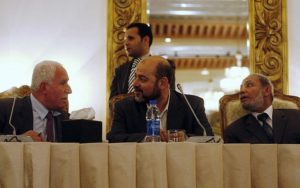Gaza’s governance must remain in Palestinian hands

Chief Fatah negotiator for reconciliation talks Azzam al-Ahmed, left, sits next to Hamas leaders Moussa Abu Marzoug, center, and Mahmoud Al Zahar, right, 2011
Said Zeedani writes in +972 on 8 October 2024:
After a year of bloodshed, destruction, and unimaginable suffering in the Gaza Strip, the political future of the Palestinian territory remains unclear. From the perspective of most parties to the war — including members of the Israeli government and army — the re-establishment of direct military rule over Gaza is not a desirable or viable option. But the alternatives have been just as problematic.
Israeli Prime Minister Benjamin Netanyahu’s pseudo-fascist government still appears to be fixated on eliminating Hamas and considering imposing some form of governance structure through a network of tribal or village leagues — an idea that Israel tried but failed in the 1980s. Washington and some Arab states, meanwhile, have floated various ideas to bring Arab or international peacekeeping forces into Gaza to be responsible for security, humanitarian aid, and reconstruction.
There is no shortage of proposals for external intervention in Gaza. But it bears emphasizing that governance of the Strip after the war is an internal Palestinian affair, and anyone who thinks otherwise is deluding themselves. The people of Gaza will settle for nothing less than Palestinian leaders known for their national commitment and moral integrity.
This does not mean, however, that Gaza’s future should remain solely in the hands of either Hamas or the Palestinian Authority (PA). By the time the war ends, Hamas’ exclusive rule over Gaza will have either ended or reached the verge of collapse. This outcome will partly be due to the exhaustion of its military capabilities and the siege imposed by the invading Israeli army, but for two additional reasons as well.
First, for many Palestinians including in Gaza, Hamas bears its share of responsibility for the war it ignited and the devastating consequences that followed; and second, Hamas’ continued rule is not in the best interests of Gaza’s reconstruction — a process that requires astronomical sums from Arab and international donors who are, to say the least, hostile to Hamas and its regional allies. None of this negates the need for both Hamas and Fatah to support whoever governs the Strip after the war; indeed, an agreement between the two parties may be essential for this.
Yet the end of Hamas’ rule also does not imply that the PA is capable of governing Gaza after the war, nor that the PA will be welcomed for this role. Hamas, and indeed many Palestinians, accuse the PA of inaction and abandonment. Israel accuses it of incitement and incompetence, while punishing it for pursuing actions in international forums and courts. The United States likewise accuses the PA of administrative failure and financial corruption, and the Arab states are also unable to help the PA overcome its deficiencies.
Responsibilities of an interim authority
In light of the above, it is vital and urgent to build an internal Palestinian national consensus around forming an interim governing authority or national body to administer the Gaza Strip’s affairs. This body should be composed of respected national figures who are accepted, endorsed, and supported by Hamas and the PA (though without the major leaders of either faction), as well as by key states expected to finance Gaza’s reconstruction. The tasks and responsibilities of such an interim authority can be summarized as follows:
